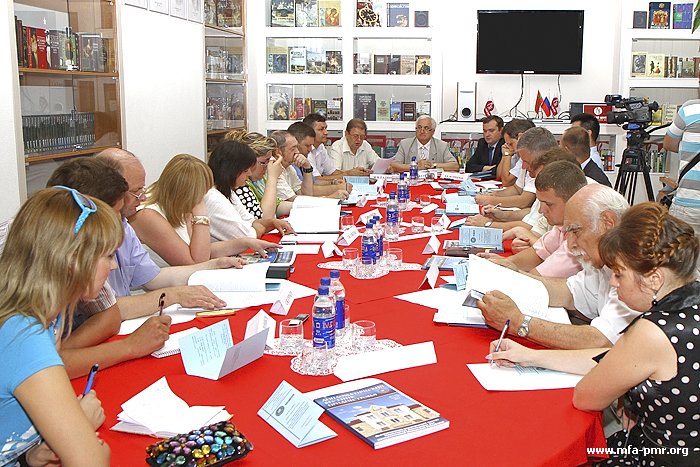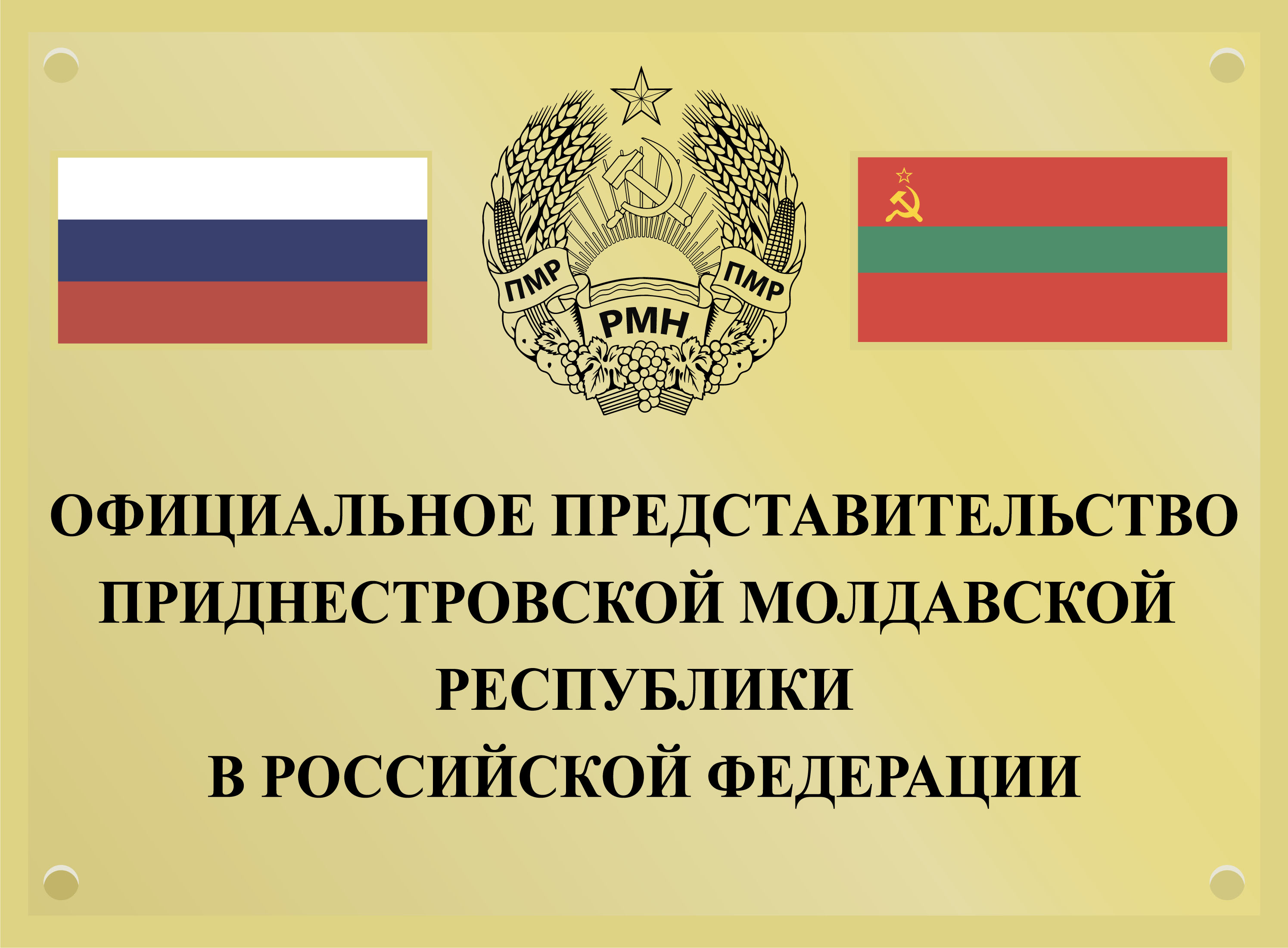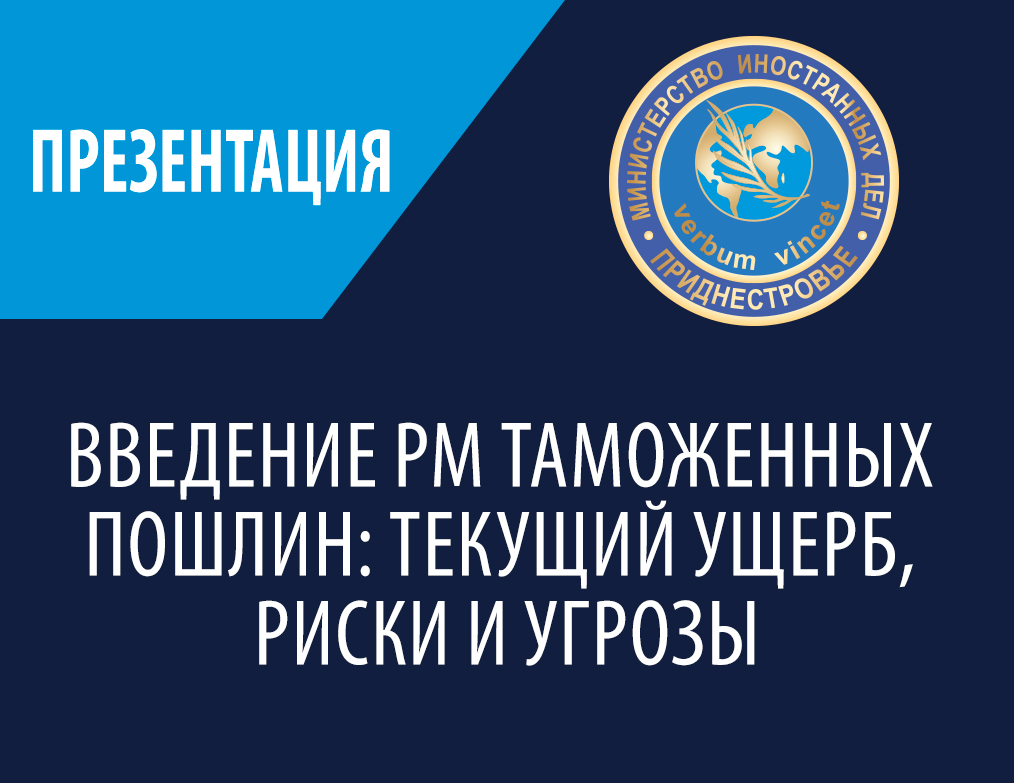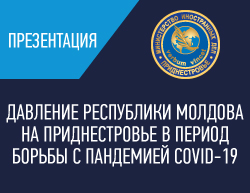“Moldova-Pridnestrovie Settlement in the Light of Positions of the Participants and International Experience: Reality and Expectations” – this topic was debated today on the initiative of the Foreign Ministry of the PMR and with the support of the Pridnestrovien T.G. Shevchenko State University at the round table with the participation of the Pridnestrovien experts. Involved in the forum were Rector of the Pridnestrovien State University Stepan Beril, Director of Scientific and Research Institute of Strategic Analysis and Forecasting Iliya Galinskiy. The Ministry of Foreign Affairs of the PMR was represented by Head of the foreign office Vladimir Yastrebchak, Deputies Foreign Minister Vitaliy Ignatiev and Sergey Simonenko, deputy chief of the Information Support Department Igor Shornikov.
Experts and diplomats coincide in the opinion that in these latter days international attention to Moldova-Pridnestrovie conflict is growing. Pridnestrovien topic even more frequently appears in western and Russian mass media; authoritative politicians and diplomats steadfastly speak about the need for a speedy settlement. Vladimir Yastrebchak paid attention of the participants of the round table to the rate of visits of representative delegation to Pridnestrovie, to stepping-up of interaction between Tiraspol and Kishinev in recent days, and also to exaggerated expectations of some of participants of the settlement from current events in the framework of the Moldova-Pridnestrovie dialogue. Thus, the 21 June Moscow meeting was perceived by many international partners as a forum for officializing the 5+2 consultative format. However, when this had failed to take place, disappointment came. Western mass media even made an attempt to blame the Pridnestrovien side for what had happened. In this connection, the Minister stressed that Tiraspol's stance is defined by the Constitution of the PMR and the will of the people and doesn't depend on the stance of international partners. Along with this, as the diplomat emphasized, both in Moscow and in Kiev one is convinced that Tiraspol and Kishinev should make arrangements on equal basis rather than wait for ready formulas from the European capitals or from beyond the ocean.
Iliya Galinskiy also drew attention of experts to the growing attention to Pridnestrovie on the part of the European Union and the USA. He cited opinion of some foreign experts who note that for western countries the Moldova-Pridnestrovie conflict is becoming the most interesting for the efforts to be exerted. Such close attention, in the words of the political analyst, is an alarming signal. He explained that the West considers the conflict to be easily resolved and can intervene in order to achieve quick results in its own interests. These interests, however, are unlikely to coincide with the will of the Pridnestrovien people.
International recognition of the Republic of Southern Sudan, independence of which was formalized, inter alia by means of referendum mechanism, was also one of the major topics. Experts paid attention to the fact that the case of Southern Sudan is not the only precedent in which referendum is used as a mechanism of settlement. Analogous recipes were applied during separation of Serbia and Montenegro, in Northern Cyprus, in Quebec. Everywhere referendum is acknowledged as an efficient and legitimate instrument. But in relation to Pridnestrovie international actors seem to adhere to other norms. Experts suggested that in this case it is possible that those scenarios are fulfilled which are connected with the interests of the third countries. In particular, political scientist Andrey Safonov pointed out that several years ago Romania agreed to have its eastern border run along the Dniester; today, however, opinion of Romania's political elite has changed. Taking into consideration the recent tendencies in the European policy, Bucharest hopes to hit entire jackpot, that is, not to do with annexation of Moldova without Pridnestrovie.
How shall Pridnestrovie behave in current conditions? What strategy is to be chosen? Many experts agreed that the concept of a “postponed status” could become a good variant for Tiraspol. Historian Nikolai Babilunga voiced an advice which was given to Moldova and Pridnestrovie by independent European experts during one of the seminars, “Forget about political talks, leave them for future generations, tackle ecology, social and economic spheres. After 50 years it will be easier for future generations to decide, what form of existence is better for Moldova and Pridnestrovie”. Experts admitted that policy of small steps, attempt to achieve concrete practical results in order to make life in Pridnestrovie more comfortable, can become in future a good basis both for political settlement and improvement of international image of the PMR.
In experts' view, interaction of the Ministry of Foreign Affairs with the civil society can become an important component of promotion of Pridnestrovie's foreign policy interests. Director of the “New Age” Research Center Elena Bobkova mentioned data of sociological surveys regarding factors influencing resolution of the Moldova-Pridnestrovie conflict. She marked notable increase of a number of people who are assured that the civil society is able and should influence the course of settlement of relations between Kishinev and Tiraspol.
In this connection, the leadership of the foreign office informed that in order to enable expert community's support and correction of Pridnestrovie's foreign policy course, PMR's Foreign Ministry creates Public and Expert Council which is expected to start its work as late as end of august. According to Vitaliy Ignatiev, the new public body is necessary, primarily, for the opinion of the Pridnestrovien population on current foreign policy issues to be presented more fully and well founded, and for international community to have detailed understanding of the position of the Pridnestrovien society. Vladimir Yastrebchak laid special emphasis on the fact that the given public council is a kind of an instrument of civil control over foreign policy course. By presenting a consolidated position, its participants can provide qualified support to diplomatic activity of Pridnestrovie.
Summarizing the outcome of the forum, Vladimir Yastrebchak marked that in the present-day world there are still contradictions of the principles of international law when solving crisis situations and conflicts, in particular, between the principles of territorial integrity and the will of people for self-determination. In these latter days the priority in settling conflicts is given to the referendum principle. The will of people and willingness of people to struggle for their rights is becoming today an efficient factor of international relations. The Minister expressed his belief that the Pridnestrovien expert society would continue to actively promote political unity of the Pridnestrovien people.













